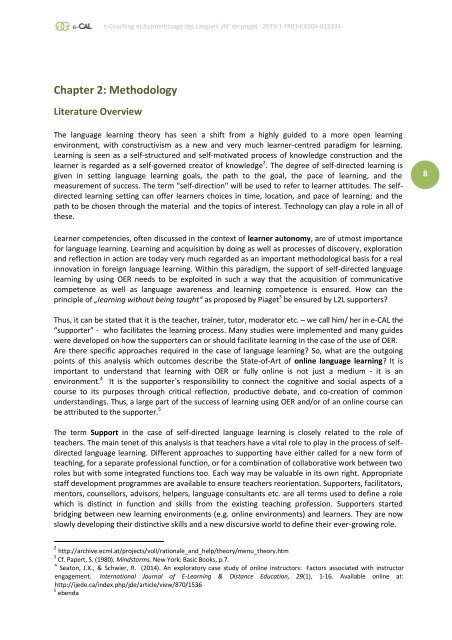e-CAL - e-Coaching et Apprentissage des Langues
The ERASMUS+ project e-CAL presents the result of an analysis of support methods in the case of language learning using web-based Open Educational Resources (OER).
The ERASMUS+ project e-CAL presents the result of an analysis of support methods in the case of language learning using web-based Open Educational Resources (OER).
Create successful ePaper yourself
Turn your PDF publications into a flip-book with our unique Google optimized e-Paper software.
e-<strong>Coaching</strong> <strong>et</strong> <strong>Apprentissage</strong> <strong>des</strong> <strong>Langues</strong> /N° de proj<strong>et</strong> : 2015-1-FR01-KA204-015334<br />
Chapter 2: M<strong>et</strong>hodology<br />
Literature Overview<br />
The language learning theory has seen a shift from a highly guided to a more open learning<br />
environment, with constructivism as a new and very much learner-centred paradigm for learning.<br />
Learning is seen as a self-structured and self-motivated process of knowledge construction and the<br />
learner is regarded as a self-governed creator of knowledge 2 . The degree of self-directed learning is<br />
given in s<strong>et</strong>ting language learning goals, the path to the goal, the pace of learning, and the<br />
measurement of success. The term "self-direction" will be used to refer to learner attitu<strong>des</strong>. The selfdirected<br />
learning s<strong>et</strong>ting can offer learners choices in time, location, and pace of learning; and the<br />
path to be chosen through the material and the topics of interest. Technology can play a role in all of<br />
these.<br />
8<br />
Learner comp<strong>et</strong>encies, often discussed in the context of learner autonomy, are of utmost importance<br />
for language learning. Learning and acquisition by doing as well as processes of discovery, exploration<br />
and reflection in action are today very much regarded as an important m<strong>et</strong>hodological basis for a real<br />
innovation in foreign language learning. Within this paradigm, the support of self-directed language<br />
learning by using OER needs to be exploited in such a way that the acquisition of communicative<br />
comp<strong>et</strong>ence as well as language awareness and learning comp<strong>et</strong>ence is ensured. How can the<br />
principle of „learning without being taught“ as proposed by Piag<strong>et</strong> 3 be ensured by L2L supporters?<br />
Thus, it can be stated that it is the teacher, trainer, tutor, moderator <strong>et</strong>c. – we call him/ her in e-<strong>CAL</strong> the<br />
“supporter” - who facilitates the learning process. Many studies were implemented and many gui<strong>des</strong><br />
were developed on how the supporters can or should facilitate learning in the case of the use of OER.<br />
Are there specific approaches required in the case of language learning? So, what are the outgoing<br />
points of this analysis which outcomes <strong>des</strong>cribe the State-of-Art of online language learning? It is<br />
important to understand that learning with OER or fully online is not just a medium - it is an<br />
environment. 4 It is the supporter`s responsibility to connect the cognitive and social aspects of a<br />
course to its purposes through critical reflection, productive debate, and co-creation of common<br />
understandings. Thus, a large part of the success of learning using OER and/or of an online course can<br />
be attributed to the supporter. 5<br />
The term Support in the case of self-directed language learning is closely related to the role of<br />
teachers. The main ten<strong>et</strong> of this analysis is that teachers have a vital role to play in the process of selfdirected<br />
language learning. Different approaches to supporting have either called for a new form of<br />
teaching, for a separate professional function, or for a combination of collaborative work b<strong>et</strong>ween two<br />
roles but with some integrated functions too. Each way may be valuable in its own right. Appropriate<br />
staff development programmes are available to ensure teachers reorientation. Supporters, facilitators,<br />
mentors, counsellors, advisors, helpers, language consultants <strong>et</strong>c. are all terms used to define a role<br />
which is distinct in function and skills from the existing teaching profession. Supporters started<br />
bridging b<strong>et</strong>ween new learning environments (e.g. online environments) and learners. They are now<br />
slowly developing their distinctive skills and a new discursive world to define their ever-growing role.<br />
2 http://archive.ecml.at/projects/voll/rationale_and_help/theory/menu_theory.htm<br />
3 Cf. Papert, S. (1980). Mindstorms. New York: Basic Books, p.7.<br />
4 Seaton, J.X., & Schwier, R. (2014). An exploratory case study of online instructors: Factors associated with instructor<br />
engagement. International Journal of E-Learning & Distance Education, 29(1), 1-16. Available online at:<br />
http://ijede.ca/index.php/jde/article/view/870/1536<br />
5 ebenda


